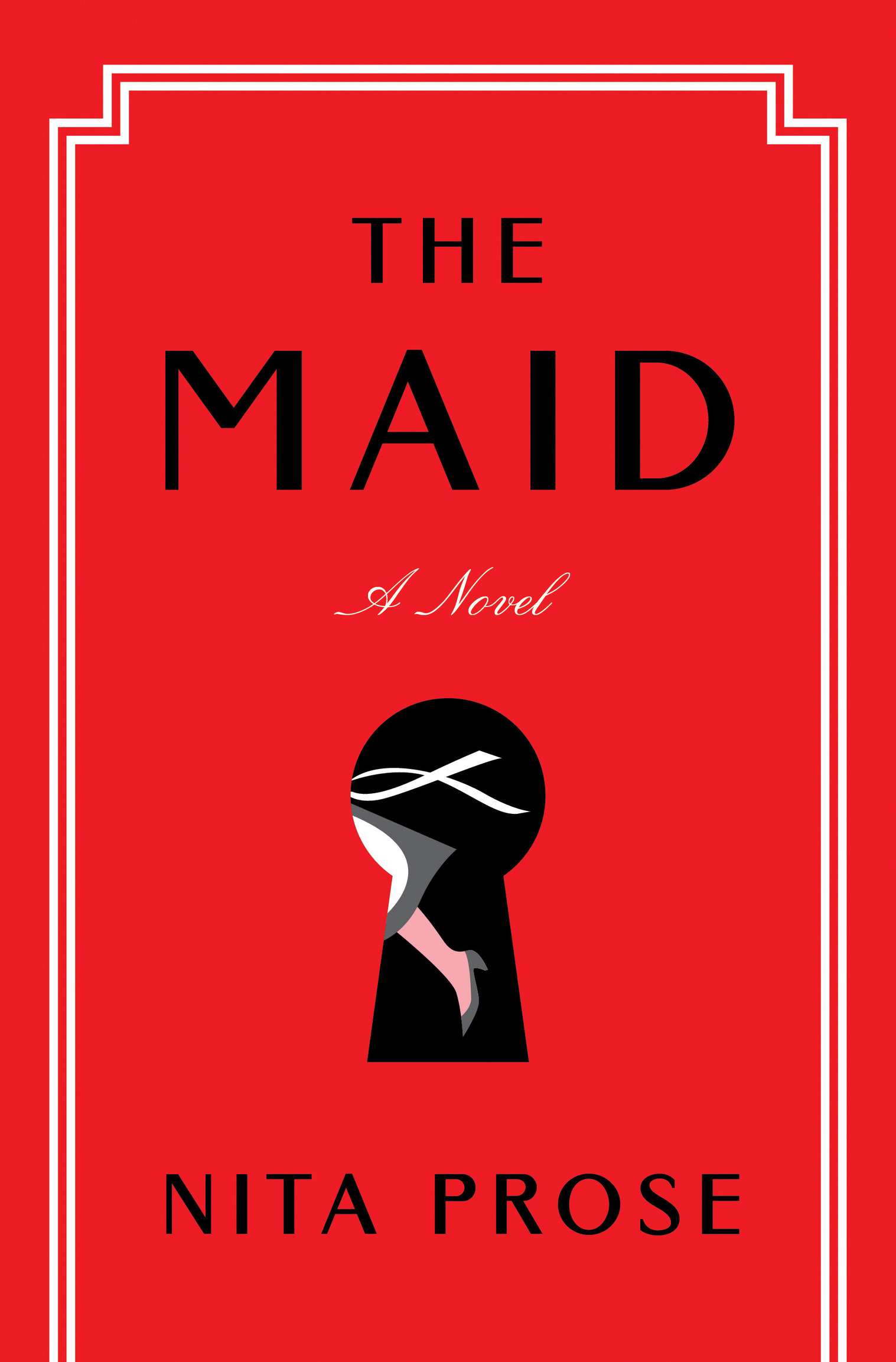The Maid
Authors: Nita Prose



The Maid
is a work of fiction. Names, characters, places, and incidents are the products of the author’s imagination or are used fictitiously. Any resemblance to actual events, locales, or persons, living or dead, is entirely coincidental.
Copyright © 2022 by Nita Prose Inc.
All rights reserved.
Published in the United States by Ballantine Books, an imprint of Random House, a division of Penguin Random House LLC, New York.
Ballantine
and the
House
colophon are registered trademarks of Penguin Random House LLC.
LIBRARY OF CONGRESS CATALOGING-IN-PUBLICATION DATA
Names: Prose, Nita, author.
Title: The maid: a novel / Nita Prose.
Description: First edition. | New York: Ballantine Books, [2022]
Identifiers: LCCN 2020057416 (print) | LCCN 2020057417 (ebook) | ISBN 9780593356159 (hardcover; acid-free paper) | ISBN 9780593356166 (ebook)
Subjects: GSAFD: Suspense fiction.
Classification: LCC PR9199.4.P7768 M35 2022 (print) | LCC PR9199.4.P7768 (ebook) | DDC 813/.6—dc23
LC record available at
https://lccn.loc.gov/2020057416
LC ebook record available at
https://lccn.loc.gov/2020057417
Ebook ISBN 9780593356166
Book design by Virginia Norey, adapted for ebook
Cover design: Elena Giavaldi
ep_prh_6.0_138928805_c0_r0

I am your maid. I’m the one who cleans your hotel room, who enters like a phantom when you’re out gallivanting for the day, no care at all about what you’ve left behind, the mess, or what I might see when you’re gone.
I’m the one who empties your trash, tossing out the receipts you don’t want anyone to discover. I’m the one who changes your sheets, who can tell if you slept in them and if you were alone last night or not. I’m the one who straightens your shoes by the door, who puffs up your pillows and finds stray hairs on them. Yours? Not likely. I’m the one who cleans up after you drink too much and soil the toilet seat, or worse.
When I’m done with my work, I leave your room pristine. Your bed is made perfectly, with four plump pillows, as though no one had ever lain there. The dust and grime you left behind has been vacuumed into oblivion. Your polished mirror reflects your face of innocence back at you. It’s as though you were never here. It’s as though all of your filth, all of your lies and deceits, have been erased.
I am your maid. I know so much about you. But when it comes down to it: what is it that you know about me?


I am well aware that my name is ridiculous. It was not ridiculous before I took this job four years ago. I’m a maid at the Regency Grand Hotel, and my name is Molly. Molly Maid. A joke. Before I took the job, Molly was just a name, given to me by my estranged mother, who left me so long ago that I have no memory of her, just a few photos and the stories Gran has told me. Gran said my mother thought Molly was a cute name for a girl, that it conjured apple cheeks and pigtails, neither of which I have, as it turns out. I’ve got simple, dark hair that I maintain in a sharp, neat bob. I part my hair in the middle—the exact middle. I comb it flat and straight. I like things simple and neat.
I have pointed cheekbones and pale skin that people sometimes marvel at, and I don’t know why. I’m as white as the sheets that I take off and put on, take off and put on, all day long in the twenty-plus rooms that I make up for the esteemed guests at the Regency Grand, a five-star boutique hotel that prides itself on “sophisticated elegance and proper decorum for the modern age.”
Never in my life did I think I’d hold such a lofty position in a grand hotel. I know others think differently, that a maid is a lowly nobody. I know we’re all supposed to aspire to become doctors and lawyers and rich real-estate tycoons. But not me. I’m so thankful for my job that I
pinch myself every day. I really do. Especially now, without Gran. Without her, home isn’t home. It’s as though all the color has been drained from the apartment we shared. But the moment I enter the Regency Grand, the world turns Technicolor bright.
As I place a hand on the shining brass railing and walk up the scarlet steps that lead to the hotel’s majestic portico, I’m Dorothy entering Oz. I push through the gleaming revolving doors and I see my true self reflected in the glass—my dark hair and pale complexion are omnipresent, but a blush returns to my cheeks, my raison d’être restored once more.
Once I’m through the doors, I often pause to take in the grandeur of the lobby. It never tarnishes. It never grows drab or dusty. It never dulls or fades. It is blessedly the same each and every day. There’s the reception and concierge to the left, with its midnight-obsidian counter and smart-looking receptionists in black and white, like penguins. And there’s the ample lobby itself, laid out in a horseshoe, with its fine Italian marble floors that radiate pristine white, drawing the eye up, up to the second-floor terrace. There are the ornate Art Deco features of the terrace and the grand marble staircase that brings you there, balustrades glowing and opulent, serpents twisting up to golden knobs held static in brass jaws. Guests will often stand at the rails, hands resting on a glowing post, as they survey the glorious scene below—porters marching crisscross, dragging suitcases behind them, guests lounging in sumptuous armchairs or couples tucked into emerald love seats, their secrets absorbed into the deep, plush velvet.
But perhaps my favorite part of the lobby is the olfactory sensation, that first redolent breath as I take in the scent of the hotel itself at the start of every shift—the mélange of ladies’ fine perfumes, the dark musk of the leather armchairs, the tangy zing of lemon polish that’s used twice daily on the gleaming marble floors. It is the very scent of animus. It is the fragrance of life itself.
Every day, when I arrive to work at the Regency Grand, I feel alive again, part of the fabric of things, the splendor and the color. I am part of the design, a bright, unique square, integral to the tapestry.
Gran used to say, “If you love your job, you’ll never work a day in your life.” And she’s right. Every day of work is a joy to me. I was born to do this job. I love cleaning, I love my maid’s trolley, and I love my uniform.
There’s nothing quite like a perfectly stocked maid’s trolley early in the morning. It is, in my humble opinion, a cornucopia of bounty and beauty. The crisp little packages of delicately wrapped soaps that smell of orange blossom, the tiny Crabtree & Evelyn shampoo bottles, the squat tissue boxes, the toilet-paper rolls wrapped in hygienic film, the bleached white towels in three sizes—bath, hand, and washcloth—and the stacks of doilies for the tea-and-coffee service tray. And last but not least, the cleaning kit, which includes a feather duster, lemon furniture polish, lightly scented antiseptic garbage bags, as well as an impressive array of spray bottles of solvents and disinfectants, all lined up and ready to combat any stain, be it coffee rings, vomit—or even blood. A well-stocked housekeeping trolley is a portable sanitation miracle; it is a clean machine on wheels. And as I said, it is beautiful.
And my uniform. If I had to choose between my uniform and my trolley, I don’t think I could. My uniform is my freedom. It is the ultimate invisibility cloak. At the Regency Grand, it’s dry cleaned daily in the hotel laundry, which is located in the dank bowels of the hotel down the hall from our housekeeping change rooms. Every day before I arrive at work, my uniform is hooked on my locker door. It comes wrapped in clingy plastic, with a little Post-it note that has my name scrawled on it in black marker. What a joy it is to see it there in the morning, my second skin—clean, disinfected, newly pressed, smelling like a mixture of fresh paper, an indoor pool, and nothingness. A new beginning. It’s as though the day before and the many days before that have all been erased.
When I don my maid uniform—not the frumpy
Downton Abbey
style or even the Playboy-bunny cliché, but the blinding-white starched dress shirt and the slim-fit black pencil skirt (made from stretchy fabric for easy bending)—I am whole. Once I’m dressed for my workday, I feel more confident, like I know just what to say and do—at least, most of
the time. And once I take off my uniform at the end of the day, I feel naked, unprotected, undone.
The truth is, I often have trouble with social situations; it’s as though everyone is playing an elaborate game with complex rules they all know, but I’m always playing for the first time. I make etiquette mistakes with alarming regularity, offend when I mean to compliment, misread body language, say the wrong thing at the wrong time. It’s only because of my gran that I know a smile doesn’t necessarily mean someone is happy. Sometimes, people smile when they’re laughing at you. Or they’ll thank you when they really want to slap you across the face. Gran used to say my reading of behaviors was improving—
every day in every way, my dear
—but now, without her, I struggle. Before, when I rushed home after work, I’d throw open the door to our apartment and ask her questions I’d saved up over the day. “I’m home! Gran, does ketchup really work on brass, or should I stick to salt and vinegar? Is it true that some people drink tea with cream? Gran, why did they call me Rumba at work today?”
But now, when the door to home opens, there’s no “Oh, Molly dear, I can explain” or “Let me make you a proper cuppa and I’ll answer all of that.” Now our cozy two-bedroom feels hollow and lifeless and empty, like a cave. Or a coffin. Or a grave.
I think it’s because I have difficulty interpreting expressions that I’m the last person anyone invites to a party, even though I really like parties. Apparently, I make awkward conversation, and if you believe the whispers, I have no friends my age. To be fair, this is one hundred percent accurate. I have no friends my age, few friends of any age, for that matter.
But at work, when I’m wearing my uniform, I blend in. I become part of the hotel’s décor, like the black-and-white-striped wallpaper that adorns many a hallway and room. In my uniform, as long as I keep my mouth shut, I can be anyone. You could see me in a police lineup and fail to pick me out even though you walked by me ten times in one day.
Recently, I turned twenty-five, “a quarter of a century” my gran
would proclaim to me now if she could say anything to me. Which she can’t, because she is dead.
Yes, dead. Why call it anything other than what it is? She did not pass away, like some sweet breeze tickling the heather. She did not go gently. She died. About nine months ago.
The day after her death was a lovely, balmy day, and I went to work, as usual. Mr. Alexander Snow, the hotel manager, was surprised to see me. He reminds me of an owl. He has tortoiseshell glasses that are very large for his squat face. His thinning hair is slicked back, with a widow’s peak. No one else at the hotel likes him much. Gran used to say,
Never mind what others think; it’s what
you
think that matters.
And I agree. One must live by her own moral code, not follow like a sheep, blindly.
“Molly, what are you doing here?” Mr. Snow asked when I showed up for work the day after Gran died. “I’m so sorry for your loss. Mr. Preston told me that your grandmother passed away yesterday. I already called in a replacement for your shift. I assumed you’d take today off.”
“Mr. Snow, why did you assume?” I asked. “As Gran used to say, when you assume, you make an A-S-S out of U and ME.”
Mr. Snow looked like he was going to regurgitate a mouse. “Please accept my condolences. And are you sure you don’t want the day off?”
“It was Gran who died, not me,” I replied. “The show must go on, you know.”
His eyes widened, which perhaps suggests shock? I’ll never understand it—why people find the truth more shocking than lies.
Still, Mr. Snow relented. “As you wish, Molly.”
A few minutes later, I was downstairs in one of the housekeeping change rooms donning my maid’s uniform as I do every day, as I did just this morning, as I’ll do tomorrow even though someone else—not my gran—died today. And not at home but at the hotel.
Yes. That’s right. Today at work, I found a guest very dead in his bed. Mr. Black.
The
Mr. Black. Other than that, my workday was as normal as ever.
Isn’t it interesting how one seismic event can change your memory
of what occurred? Workdays usually slide together, the daily tasks blending into one another. The trash bins I empty on the fourth floor meld into those on the third. I would swear I’m cleaning Suite 410, the corner room that overlooks the west side of the street, but actually I’m at the other end of the hotel, in Room 430, the east-side corner room, which is the mirror inverse of Suite 410. But then something out of the ordinary occurs—such as finding Mr. Black very dead in his bed—and suddenly the day crystalizes, turns from gas to solid in an instant. Every moment becomes memorable, unique from all the other days of work that came before.
It was today, around three in the afternoon, nearing the end of my shift, when the seismic event occurred. I’d cleaned all of my assigned rooms already, including the Blacks’ penthouse on the fourth floor, but I needed to return to the suite to finish cleaning their bathroom.
Don’t think for a moment that I’m sloppy or disorganized in my work just because I cleaned the Black penthouse twice. When I clean a room, I attack it from top to bottom. I leave it spotless and pristine—no surface left unwiped, no grime left behind.
Cleanliness is next to godliness,
my gran used to say, and I believe that’s a better tenet to live by than most. I don’t cut corners, I shine them. No fingerprint left to erase, no smear left to clear.
So it’s not that I simply got lazy and decided
not
to clean the Blacks’ bathroom when I scoured the rest of their suite this morning.
Au contraire,
the bathroom was guest-occupied at the time of my first sanitation visit. Giselle, Mr. Black’s current wife, hopped in the shower soon after I arrived. And while she granted me permission (more or less) to clean the rest of the penthouse while she bathed, she lingered for rather a long time in the shower, so much so that steam began to snake and billow out of the crack at the bottom of the bathroom door.
Mr. Charles Black and his second wife, Giselle Black, are longtime repeat guests at the Regency Grand. Everyone in the hotel knows them; everyone in the whole country knows of them. Mr. Black stays—or rather,
stayed—with us for at least a week every month while he oversaw his real-estate affairs in the city. Mr. Black is—was—a famous impresario, a magnate, a tycoon. He and Giselle often graced the society pages. He’d be described as “a middle-aged silver fox,” though, to be clear, he is neither silver nor a fox. Giselle, meanwhile, was oft described as “a young, lithe trophy socialite.”
I found this description complimentary, but when Gran read it, she disagreed. When I asked why, she said,
It’s what’s between the lines, not on them.
Mr. and Mrs. Black have been married a short time, about two years. We at the Regency Grand have been fortunate that this esteemed couple regularly grace our hotel. It gives us prestige. Which in turn means more guests. Which in turn means I have a job.
Once, over twenty-three months ago, when we were walking in the Financial District, Gran pointed out all the buildings owned by Mr. Black. I hadn’t realized he owned about a quarter of the city, but alas, he does. Or did. As it turns out, you can’t own property when you’re a corpse.
“He does not own the Regency Grand,” Mr. Snow once said about Mr. Black when Mr. Black was still very much alive. Mr. Snow punctuated his comment with a funny little sniff. I have no idea what that sniff was supposed to mean. One of the reasons why I’ve become fond of Mr. Black’s second wife, Giselle, is because she tells me things plainly. And she uses her words.
